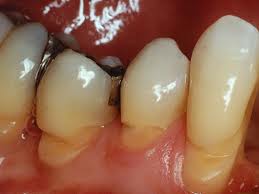Do you wake up in the morning with headaches? Does your jaw feel tight? Do you feel like you may have been fighting in your sleep and that someone punched you in the face? Tooth grinding and jaw clenching may be the answer to why you are experiencing those things in the morning.
Because grinding often occurs during sleep, most people are unaware that they grind their teeth. However, a dull, constant headache or sore jaw is a telltale symptom of bruxism. Many times people learn that they grind their teeth by their loved one who hears the grinding at night.
Some reasons that you may be grinding your teeth include:
- Stress
- Anxiety
- An abnormal bite (malocclusion)
- Crooked teeth
- Trauma
Chronic and untreated teeth grinding can result in a fracturing, loosening, or loss of teeth. The chronic grinding may wear their teeth down to stumps. The teeth may need more comprehensive dental treatment including crowns and bridges, implants, and dentures.Not only can severe grinding damage teeth and result in tooth loss, it can also affect your jaws, result in hearing loss, cause or worsen TMD/TMJ, and even change the appearance of your face.
Upon examination, Dr. Hill will determine the cause of your teeth grinding/ bruxism and use the correct course of action to treat it. We will help prevent you from waking holding your jaw again.
Are you tired of showing that gummy smile or covering your mouth when you laugh? Are you ready to eat steak and other things that you just cannot enjoy without teeth? Dentures may be your answer. 
Dentures or false teeth are a removable appliance that is used to replace teeth. A denture can replace all of your teeth (complete denture) or it can replace a few teeth that are missing (partial denture). Dentures are supported by the bone that was previously used to support your teeth as well as other tissues in your mouth.
Dentures function to improve:
1. Chewing– Dentures aid in breaking down foods by grinding, tearing, and incising foods to aid in health digestion. Without natural teeth or dentures, you are at a great risk for digestive problems from not breaking your food down into small pieces. Also, trying to eat without teeth could be a choking hazard.
2. Esthetics– A denture helps contour your mouth into a normal shape to prevent a person from looking older than the actually are. Dentures also restore your smiles by giving you teeth to show off. There are several different tooth shapes and colors to choose from when making a denture. 
3. Self-esteem– There will be no more covering your mouth when you laugh. Dentures will make your more youthful and vibrant and in turn improving how you feel about yourself. With a denture, you get to choose how straight and white your teeth look. You can essentially get the smile that you always wanted.
Contemporary Smiles can get you those teeth you have been waiting for! Give us a call to schedule for a consultation at 205-987-7044 or www.contemporarysmiles1.com
Hello everyone,
Each month I will have a question submitted to me by one of my patients as my blog entry. I hope that you find these questions and answers useful.
This month we had this question submitted:
Good morning, Dr. Hill, I have a quick question. I recently completed a dental form at your office and the form asked when was the date of my last Oral Cancer screening. Is this a standard screening done in your office as part of my routine checkup or is this something I would request out of concern? I didn’t think that a dental office would be in the practice of checking for Cancer. I should have asked you there but it slipped my mind! Thanks!
-Charlotte Jennings
Charlotte,
Thanks for your question! April is actually Oral Cancer Awareness Month so your question is especially befitting.
Oral cancer screening is a routine part of a dental examination. Regular check-ups, including an examination of the entire mouth, are essential in the early detection of cancerous and pre-cancerous conditions. You may have a very small, but dangerous, oral spot or sore and not be aware of it. Here at Contemporary Smiles Family and Cosmetic Dentistry, I will carefully examine the inside of your mouth and tongue and in some patients may notice a flat, painless, white or red spot or a small sore. Although most of these are harmless, some are not. Harmful oral spots or sores often look identical to those that are harmless, but testing can tell them apart. If you have a sore with a likely cause, we may treat it and ask you to return for re-examination. -Dr. Hill

Have you ever have that sharp pain that hits whenever you drink something cold?
You may have one tooth or several teeth that are sensitive to temperature change. Here are some causes of tooth sensitivity and some ways to relieve it:
1. The tooth has a cavity. one of the tell-tale signs of a cavity is sensitivity to cold and to sweets. A visit to the dentist and x-ray will determine if a cavity is the cause of the sensitivity you are experiencing.
2. The enamel on your tooth has worn away. Sometimes the enamel will wear away on a tooth if a person brushes their teeth too hard. This causes abraded areas or “toothbrush abrasion” to appear on teeth. Enamel is the barrier against sensitivity on a tooth; without it your tooth has more exposure to the nerve of the tooth thus causing that sharp pain.
Tooth enamel can also wear away from erosion from acids from foods and drinks. Eating too many acidic foods such as citric fruits could cause such erosion. Your dentist will determine if filling material needs to be placed on the area to act as a barrier.
3. A tooth is fractured. A tooth that is fractured may be sensitive to cold and pressure. A dentist will perform a series of tests and dental x-rays to locate the fracture and determine if the tooth can be saved.
In summary, there is very little that you can do to remedy a tooth sensitivity issue without a proper diagnosis of the problem from a licensed dental professional. A sensitivity toothpaste may provide temporary relief but it is best to seek a professional opinion.
We would love to help remedy your tooth sensitivity issue at Contemporary Smiles Family and Cosmetic Dentistry located at 2503 John Hawkins Parkway, Suite 101, Hoover AL 35244.
There are several reasons that a person may be afraid to see the dentist. One way to decrease the possibility of having extensive dental work done is to make sure you see the dentist for a routine dental exam and cleaning. Having a routine dental exam and cleaning is a preventive used to prevent cavities or to catch any problems going on in your mouth before they get too bad. 
Most people should have an exam and cleaning every 6 months. If you are putting off going to the dentist because of a fear here are some myths and tips for overcoming that fear to having your teeth professionally cleaned.
1. Teeth cleaning is supposed to hurt. This is simply not true. If you are brushing properly and flossing regularly your teeth and gums should not hurt while they are being cleaned. If your first visit is uncomfortable, I can assure you that your next should not be. Your dentist or hygienist will teach you proper brushing and flossing techniques to prevent the discomfort.
2. My gums should bleed while I am getting my teeth cleaned. Your gums should not bleed at any time. This is a sign of gingivitis. If your dental hygienist or dentist notices bleeding while cleaning she will teach you proper brushing and flossing techniques to prevent the bleeding. If deemed necessary, she will prescribe a medicated mouth rinse for you to use.
3. My teeth always hurt after I have them cleaned. Sometimes there is plaque and calculus buildup on your teeth that could provide a layer of insulation. Once this buildup is removed, more than likely there is some area of the tooth root exposed. This is what causes the sensitivity. The calculus buildup has to be removed to prevent further damage to the tooth and gums. The hygienist will suggest a sensitivity toothpaste and if needed the dentist may recommend filling material being placed on the exposed root surface.
In summary, it is better to prevent than to fix. If you get your routine dental exam and cleaning, you are decreasing your chances of having cavities and saving money. Your dentist has also has a better chance of catching any small cavities and filling them versus having to do a root canal on large cavities that have been ignored.
We would love to help you conquer your fear at Contemporary Smiles Family and Cosmetic Dentistry!





